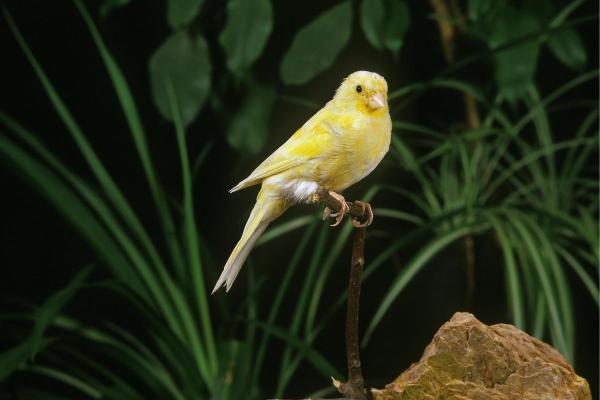How Do Canaries Sleep?


Canaries, those cheerful songbirds known for their vibrant melodies, are diurnal creatures, meaning they are primarily active during the day and sleep at night. Just like humans, they require adequate rest to maintain their overall health and well-being. Understanding their sleep patterns and habits is crucial for ensuring they get the restorative slumber they need to thrive.
In this article from AnimalWised, we explore canary sleep, including their sleep patterns, habits, and the significance of a suitable sleep environment. By grasping these crucial aspects of their well-being, you can help your canary enjoy the rest they need to stay healthy, content, and prepared to serenade your home with their melodious songs.
When do canaries sleep?
In the animal world, just like humans, birds need their sleep to stay healthy and energized. Different bird species have varying sleep patterns based on whether they are active during the day or night.
Canaries, both in the wild and as pets, primarily sleep at night and remain active during the day.
At what time do canaries go to sleep?
The exact time when canaries go to sleep depends on their location and the time of sunset. As darkness falls, they naturally prepare for their nightly rest and sleep until sunrise, marking the start of a new day. However, like other animals, canaries can be disturbed from their sleep by sudden noises or disruptions.
Ensuring adequate sleep for pet canaries is essential for their overall health and well-being. Providing a quiet, dark, and secure sleeping space helps them maintain a regular sleep schedule and maximize the benefits of their rest. A well-rested canary is a happy and healthy companion, ready to fill your home with its beautiful songs and cheerful presence.
Enhance your canary care skills and create a happy home for your feathered friend with our practical guide.

Sleep cycle of canaries
The sleep patterns of canaries are closely tied to natural light cues, primarily influenced by the cycles of sunrise and sunset. This means that artificial light, even at night, can disrupt a canary's sleep cycle, which is particularly relevant as these birds are often kept as pets in many households.
Similar to other vertebrates, birds, including canaries, exhibit a relationship between their production of melatonin and their sleep-wake rhythms, with light exposure playing a significant role. In the case of birds, melatonin is a key player in regulating their sleep patterns. Excessive exposure to light, especially during the nighttime hours, can disturb a canary's circadian sleep cycle, potentially impacting their overall well-being.
However, canaries can take short naps during the day.
How long do canaries sleep?
To maintain their health, canaries typically require a daily sleep duration of approximately 8 to 10 hours. Ensuring they get adequate, uninterrupted sleep is essential for their overall well-being and vitality.
Interested in the special bond between canaries and their owners? Explore this article to learn more about the unique relationship they share.
Do canaries sleep with their eyes open?
Canaries, along with certain other animals like dolphins, exhibit a fascinating phenomenon known as "unihemispheric sleep." This is a type of asymmetric brain rest, where one hemisphere of the brain remains active while the other goes to sleep. In practical terms, it means that these animals can effectively sleep with one eye open.
The reason behind unihemispheric sleep is the need for these animals to stay vigilant even during rest. Dolphins, for instance, must continue swimming and periodically surface to breathe, so they employ this unique sleep pattern to maintain their vital activities.
In the case of birds, particularly those vulnerable to predation in their natural habitats, unihemispheric sleep serves as a survival strategy. Canaries, a prime example, have evolved this system to stay alert to potential dangers even while they rest.
This intriguing adaptation allows canaries and other birds to minimize the risks associated with being prey animals in their environments. While one hemisphere of the brain rests, the other remains on the lookout for any signs of danger, ensuring their survival in the wild.
Protect your bird from parasites with our complete guide on preventing and treating lice in canaries.
How do canaries sleep in a cage?
When it comes to understanding how canaries sleep, you'll find that they do so in an upright position, perched on a branch or some other object within their cage.
This ability to sleep while perched is a remarkable feature of their anatomy. Canaries, like many other birds, possess a tendon that can be stretched and tense. When the bird bends its leg while perching, this tendon generates rigidity, allowing it to securely cling to the perch. This means that even while asleep, the canary remains stable and won't fall because it voluntarily supports itself.
As for whether it's normal for a canary to sleep on the floor of the cage, the usual behavior is for them to sleep on a perch or an object in their cage. However, there is an exception. Female canaries, especially when laying eggs, may choose to sleep in their nest to incubate and protect their eggs. In these circumstances, it's entirely normal to observe a canary sleeping on the floor of the cage if their nest is located there.
If there is no nest and your canary consistently sleeps on the cage floor, it's important to ensure that the environmental conditions in the room are suitable. This includes maintaining appropriate temperature, lighting, and ventilation. If these conditions are correct, and your canary continues to sleep on the cage floor, it may be necessary to consult a veterinarian to rule out any potential health issues.
Image source: sp.damri.edu.vn.

How to create a restful environment for canaries?
Creating a restful environment for canaries involves ensuring they have the right conditions for rest and sleep. Here's how to do it:
- Place the canary's cage in a quiet, draft-free area of your home. Avoid direct sunlight, as this can disrupt their sleep.
- Maintain a consistent light schedule. Canaries are diurnal, so they need a regular day-night cycle. Cover their cage at night to ensure darkness.
- Provide comfortable perches inside the cage. Canaries sleep perched, so make sure the perches are of the right diameter for their feet.
- Keep the area around the cage as quiet as possible during their sleep hours. Avoid loud noises, TV, or music that could disturb them.
- Maintain a comfortable room temperature. Canaries can be sensitive to temperature extremes, so avoid drafts or overly warm conditions.
- Regularly clean the cage to ensure a fresh and hygienic sleeping environment. This includes cleaning perches and changing bedding.
- If you have multiple canaries, ensure they are compatible. A companion can help reduce stress and provide comfort.
Do canaries need to be covered at night?
Canaries don't necessarily need to be covered at night, but covering their cage can offer several benefits. Covering the cage can create a dark and quiet environment, which may help your canary sleep more soundly. It can also provide a sense of security and reduce exposure to drafts.
However, it's essential to ensure that your canary still has access to fresh air, and the cover should not completely seal off the cage, as ventilation is crucial.
Additionally, it's a good practice to provide a consistent schedule for covering and uncovering the cage to establish a routine for your canary. If your canary appears comfortable and well-rested without a cover, it may not be necessary, but many canary owners find it beneficial to cover the cage at night.
Discover what can influence a canary's song and learn why they might sometimes stay quiet.
If you want to read similar articles to How Do Canaries Sleep?, we recommend you visit our Basic care category.
- BirdLife International. (2018). Serinus canaria . IUCN Red List of Threatened Species 2018. Available at: https://dx.doi.org/10.2305/IUCN.UK.2018-2.RLTS.T22720056A132137153.en
- Ricaurte, L. (2005). Does sleep exist in birds? Available at: https://www.redalyc.org/pdf/636/63617170016.pdf







